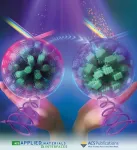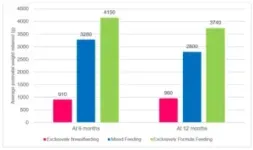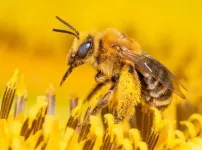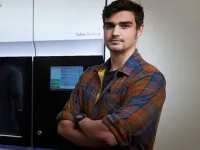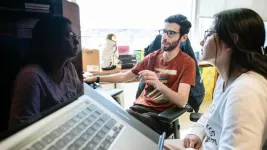(Press-News.org) A research group led by Nagoya University has developed an innovative approach to creating anti-counterfeiting labels for high-value goods. Their findings, published in ACS Applied Materials & Interfaces, enhance the security of the currently used cholesteric liquid crystals (CLCs) by adding fluorescent dyes to produce florescent CLCs (FCLCs).
Using this unique technology, the group created unique labels with almost impossible-to-counterfeit security features. These advanced labels are designed to protect valuable items, important documents, and sensitive products by generating distinctive visual patterns that are difficult to replicate without specialized tools and knowledge.
To create these specialized tags, scientists mix fluorescent dyes with CLCs, causing the helical structure of the crystals to twist either to the left or right—a property known as chirality. This twisting determines how the crystals reflect light, producing a specific “light signature”. The precise control over this twisting and the resulting light patterns makes these labels almost impossible to counterfeit.
Under normal light, the FCLCs appear as solid colors with no visible information. However, when viewed through a circular polarizer, hidden features emerge, revealing intricate details that serve as a primary security layer. Additionally, the FCLCs can include components that respond only to ultraviolet light, offering a secondary verification method.
As Professor Yukikazu Takeoka from Nagoya University explains: “The correct information is revealed only when both decoding tools—left circularly polarized light (CPL) and ultraviolet light—are employed. This dual-layer security significantly enhances the protection offered by existing CLC-based anti-counterfeiting tags.”
The FCLCs' unique iridescent colors shift depending on the concentration of chiral dopant and the polarization of the light source, adding another layer of complexity for counterfeiters attempting to replicate the labels.
By carefully adjusting the concentration of the chiral dopant, the researchers have fine-tuned the material to reverse the direction of circular polarization. This allows the FCLCs to reflect right-handed CPL while absorbing left-handed CPL, further complicating any counterfeiting attempts.
The development of FCLC particles with both circularly polarized structural color and circularly polarized luminescence marks a significant milestone in the field of anti-counterfeiting. This innovative approach holds tremendous potential for securing high-value goods and protecting sensitive products from forgery.
In the future, this technology could evolve to include additional security features, such as QR codes that become visible only under polarized light or passwords that appear under UV light. As Jialei He, a member of the research team, said: "This dual-verification system would provide two layers of protection: the structural color visible under polarized light and the fluorescent emission visible under UV light."
With these advancements, FCLCs could soon become an integral part of the security protocols for a wide range of industries, offering an unparalleled defense against counterfeiting and ensuring the integrity of high-value products.
END
Preventing counterfeiting by adding dye to liquid crystals to create uncrackable coded tags
2024-08-27
ELSE PRESS RELEASES FROM THIS DATE:
Beckman announces 2024 research seed grant awardees
2024-08-27
The Beckman Institute for Advanced Science and Technology funded two research projects in 2024 as part of its research seed grant program. The program supports interdisciplinary research projects and is now in its second year.
This year, two research projects beginning in May 2024 received $75,000 per year for up to two years.
Research projects seeded by the Beckman Institute anticipate growth and typically lead to external funding proposals after the two-year seeding term.
Exploring how ASD-related genes influence brain networks that guide behavior
The CDC estimates that “1 in 36 children has been identified with autism spectrum disorder,” or ASD.
ASDs ...
Are crops worldwide sufficiently pollinated?
2024-08-27
A team of researchers led by Rutgers University-New Brunswick scientists has analyzed crop yields of more than 1,500 fields on six continents, and found that production worldwide of important, nutritionally dense foods such as fruits, vegetables, nuts and legumes is being limited by a lack of pollinators.
The results, detailed in Nature Ecology & Evolution, showed that across diverse crops and locations, one-third to two-thirds of farms contain fields that aren’t producing at the levels they should be due to a lack of pollinators. The phenomenon of a low crop yield because of insufficient visits by insects is known as pollinator limitation.
The ...
American Meteorological Society announces 2025 weather, water, and climate honorees
2024-08-27
The American Meteorological Society is proud to announce its 2025 Awards and Honors, recognizing outstanding contributions to the weather, water, and climate community. 2025 recipients will be honored at the 105th AMS Annual Meeting in New Orleans, 12–16 January, 2025.
“One of our key priorities at AMS is to recognize the work of our global weather, water, and climate enterprise for the impact they have on scientific advancement and public safety, as well as on economic growth for all communities,” says Awards Oversight Committee Chair ...
Montana State scientists publish bacterial immune research in Nature
2024-08-27
BOZEMAN – Scientists at Montana State University have been studying unique immune systems for decades, and a research team in the Department of Microbiology and Cell Biology took another step forward with work described in a paper published in the highly regarded journal Nature.
The Aug. 7 paper, titled “A virally-encoded tRNA neutralizes the PARIS antiviral defense system,” was fast-tracked for publication by the journal due to the importance of the findings. MSU doctoral student ...
NIH prize challenge recognizes undergraduate biomedical engineers for innovative medical device designs
2024-08-26
The National Institutes of Health (NIH) and the higher education non-profit VentureWell have selected 11 winners and five honorable mentions in the Design by Biomedical Undergraduate Teams (DEBUT) Challenge, who are set to receive prizes totaling $160,000. The awards will be presented to the winning teams on Oct. 25, 2024, during the annual Biomedical Engineering Society conference in Baltimore.
Now in its 13th year, the annual DEBUT Challenge calls on teams of undergraduate students to identify ...
NJIT and Illinois research on data analytics will measure impact of scientific literature
2024-08-26
Three distinct problems in data science — trend identification in graphs, the quantitative study of scientific literature and evaluation of single-cell genomics — will all be addressed by new research in large-scale network analytics, jointly led by Distinguished Professor David Bader at New Jersey Institute of Technology.
The problems have a common challenge of finding patterns, known as community detection, from inside incredibly large datasets. Work is funded by a $648,000 National Science Foundation grant, Cyber-Infrastructure ...
UCLA receives $1 million NSF grant to accelerate commercialization of quantum technologies
2024-08-26
Researchers from the California NanoSystems Institute at UCLA and their colleagues have received a one-year, $1 million grant as part of a new National Science Foundation program aimed at accelerating the development and commercialization of quantum technologies for the benefit of society.
The Quantum Sensing and Imaging Lab, or Q-SAIL, which will be led by UCLA quantum physicist David Leibrandt, is one of five pilot projects across the country selected by the NSF to participate in the agency’s new National Quantum Virtual Laboratory, a first-of-its-kind national resource to enable the faster ...
3D shapes of viral proteins point to previously unknown roles
2024-08-26
SAN FRANCISCO—Viruses are tricky to keep up with. They evolve quickly and regularly develop new proteins that help them infect their hosts.
These rapid shifts mean that researchers are still trying to understand a multitude of viral proteins and precisely how they increase viruses’ infecting abilities—knowledge that could be crucial for developing new or better virus-fighting treatments.
Now, a team of scientists at Gladstone Institutes and the Innovative Genomics Institute led by Jennifer Doudna, PhD, have harnessed computational tools to predict the three-dimensional shapes of nearly 70,000 viral ...
UVA's first-ever data science majors begin their journey
2024-08-26
A new era at the University of Virginia’s School of Data Science officially kicked off, as the inaugural class of data science undergraduate majors arrived for orientation on the eve of UVA’s first day of classes.
Throughout the day at the new School of Data Science building, students heard from faculty and staff, learned more about their curriculum, took headshots and a group photograph, and began to familiarize themselves with classrooms and other features of the facility that would be their academic home.
The day also served as a call to action, as students learned not only what requirements would be needed to complete their degree but what a data ...
High BMI eligibility for semaglutide could cost Medicare an additional $145 billion annually
2024-08-26
Embargoed for release until 5:00 p.m. ET on 26 August 2024
Annals of Internal Medicine Tip Sheet
@Annalsofim
Below please find summaries of new articles that will be published in the next issue of Annals of Internal Medicine. The summaries are not intended to substitute for the full articles as a source of information. This information is under strict embargo and by taking it into possession, media representatives are committing to the terms of the embargo not only on their own behalf, but also on behalf of the organization they represent.
----------------------------
1. High ...
